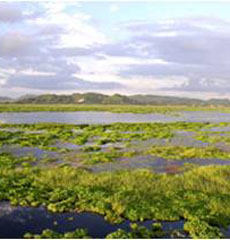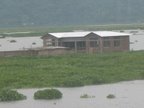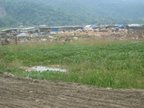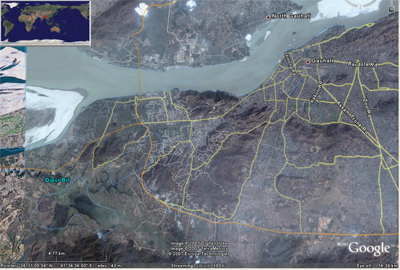
| ECS 740 Case Study: Deepor Beel wetland in India has served as a suitable habitat for a variety of amphibians, fish, reptiles, waterfowls and migratory birds. Will this ecosystem continue to survive with the current waste dumping and settlement practices? A Classic Example of Mismanagement. ECS 740 students are working in collaboration with Global Response as "consultants" and preparing a 'Management Plan' for Deepor Beel. |
||
Student Achievement: ECS 740 Student Project leads to 'Global Campaign' for better management of Deepor Beel Wetland in India! More on Deepor Beel: Deepor Wetland |
|
Contents of this Page |
|
|
This website is created as a tool for North Dakota State University (NDSU) students and faculty to reach a broad audience and speak out on issues related to environmental management. The primary objective of the site is to facilitate better understanding the concepts and practices in environmental management. The site is developed to compliment the graduate course materials on Environmental Management (ECS 740, see Course Details) offered in Environmental and Conservation Sciences (ECS) Program. Course handouts and other study materials are accessible by registered users in the Blackboard. The course is intended to give students an understanding of current environmental issues and tools for environmental management. The issues are examined from the worldwide perspectives of science, engineering, business and society. After successful completion of this course students will have a comprehensive knowledge of integrated environmental management with a global perspective. It will help them in environmental decision-making from a socio-economic-environmental standpoint. Students will obtain basic skills on collection, analysis, and management of environmental data. They will learn techniques for environmental assessment and feasibility studies. Most importantly, through this course the students will be able to correlate their research and course works to the big picture of the environment. To achieve the objectives and goals set for this course, 'live' case studies will be taken up and concepts learnt in the course will be applied to the case studies. The case studies which are or to be undertaken are not limited by proximity to our campus or direct benefit to us. We select a project based on its relevance to the course and learning value. Also we try to adhere to the principle that as world citizens it is our duty to encourage sustainable practices, ecological protection and understanding of the environment throughout the world. The Environmental Management Group will work with the stakeholders involved and come up documentations/actions that will be helpful to them in managing ‘a specific environment’. The Group will also offer networking help to stakeholders as deemed fit within the purview of the course. Two projects were selected for Fall 2007: (1) Preparation of a Management Plan for Deepor Beel Wetland in India, and (2) Life-cycle Assessment of Bio-fuel (Ethanol) with Special Reference to North Dakota. |
|
| Read More about the Course | |
| Back to Contents | |
ECS 740 students worked as "consultants" and preparing an Environmental Management Plan for Deepor Beel for the stakeholders of the wetland. Deepor Beel (Beel means wetland or large aquatic body in Assamese) is one of the largest and most important riverine wetland in the Brahmaputra valley of lower Assam, India. Located between Latitude: 26d 05m 26s N to 26d 09m 26s N and Longitude: 90d 36m 39s E to 91d 41m 25s E, Deepor covers an area of 40.14 sq km and varies in depth from approximately 4 m to 1 m depending on the season; monsoon or dry season. The site supports a number of International Union for the Protection of Nature (IUCN) red-listed species. Deepor Beel is one of the largest staging sites for migratory birds in India; some of the largest congregations of aquatic birds in Assam can be seen here, particularly in winter. The wetland supports a highly concentrated and diverse indigenous freshwater fish population. The wetland is a major fish breeding ground, which supplies fish stocks to other nearby wetlands and rivers. Because of the richness of avian fauna, Deepor Beel has been selected as one of the Important Bird Area (IBA) sites by Birdlife International and is the only Ramsar Site in the state of Assam. |
|
In addition to the invaluable fish and bird population of Deepor Beel, a large number of wetland vegetables, fruits and medicinal plants have been identified in this wetland. Most of the vegetation is directly or indirectly used by the surrounding human communities. The area provides the only major stormwater storage basin for the City of Guwahati. Stormwater detention is vital in North-east India; the highest rainfall zone in the world. Sustainable management of Deepor is important not only for the wetland itself, but for greater good of the rest of the wetlands in Assam and India. In addition, Deepor management can serve as a model for other wetlands in the region and ensure their sustainable management; most face similar threats due to unplanned and uncontrolled development. |
|
 |
 |
|
|
Environmental Management Case Study Advisor: |
|
| Back to Contents | |
FALL 2007 CASE STUDY II: |
|
ECS 740 students worked on an LCA project to identify the life-cycle components of fuel grade ethanol produced in North Dakota. The project was divided into four sub-projects and four groups of students looked at Life Cycle Components of: |
|
| LCA Case Study Advisors: Dr. Achintya Bezbaruah Assistant Professor of Civil Engineering Dr. Wei Lin Director, ECS Program and Associate Professor of Civil Engineering |
|
| Back to Contents | |
| FALL 2008 CASE STUDIES: Inputs Requested |
|
ECS 740 targets at creating global Environmental Managers and we would like to take up case studies from around the world. Please write to us with your ideas and we will follow it up: |
|
| Guest Lecturers and Topics (Fall 2007) | |
| Dr. Robert Hearne: Economic Values of Biodiversity and Scenery |
|
